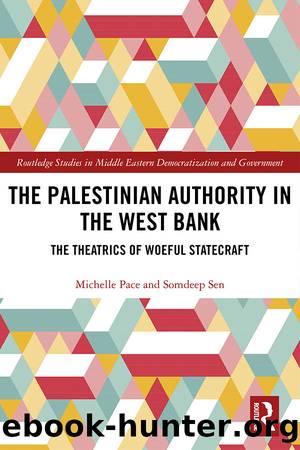The Palestinian Authority in the West Bank (Routledge Studies in Middle Eastern Democratization and Government) by Pace Michelle & Sen Somdeep

Author:Pace, Michelle & Sen, Somdeep [Pace, Michelle]
Language: eng
Format: epub
Publisher: Taylor and Francis
Published: 2018-12-18T16:00:00+00:00
Conclusion
Mahmoud Abbasâ speech at the seventy-second session of the United Nations General Assembly in New York on September 20, 2017 epitomized all the constituent elements of the theatrics of statecraft in the occupied West Bank that we have thus far been concerned with in this book. When invited to the podium he is referred to as the President of Palestine and is escorted to the stage in a ceremonial manner by members of the UNâs protocol and liaison service â much like any other state(ly) figure. Members of the audience applaud as Abbas walks up to the stage, in seeming approval of his state(ly) status. Abbas then takes a seat, after which the Vice President of the General Assembly Hery Martial Rajaonarimampianina Rakotoarimanana officially invites him to address the assembly: âOn behalf of the General Assembly I have the honor to welcome to the United Nations his Excellency the President of the State of Palestine and to invite him to address the assembly.â 5 Until this point, we see confirmation of our assertions in Chapter 2 with regard to the expansive materiality of international âinvestmentsâ in the theatrics of statecraft in the occupied Palestinian territories. Moreover, the pomp and circumstance of the lead-up to Abbasâ speech and the honorific designation granted to the Palestinian President, also confirms the insistent manner in which the theatrics of statecraft are prized (and sanctified) by international stakeholders, despite being unconvinced of their âvalueâ in the service of the Palestinian struggle for sovereign statehood.
Abbas also seems to be well-versed in the conduct expected of him as the President of the State of Palestine. The considered manner in which he walked on the stage while flanked by two members of protocol service, the still and stately way he waited to be officially invited to make his statement and in the overall tone of his speech â Abbas maintained the impression that indeed he is the representative of a Palestinian state. In these mannerisms, he mirrors our deliberations in this chapter. We began by outlining not just a history of the establishment of the PA but the manner in which, not least by way of a significant proportion of the population employed in the public sector, it has assumed a dominant material presence in the lives of Palestinians; of those salaried functionaries of the PA. It follows that, just as Abbas (as a salaried PA functionary himself) is well-versed in the conduct expected of him as President, so too are the officials at the Ministry of Interior, the senior police officers in Ramallah, and the administrators of the prison facilities in Jericho versed in the script they need to follow and the vocabulary they must use in order to give the impression that they are professional âfunctionariesâ of a state entity. Yet, alongside their ostensibly convinced performance as state functionaries, we have also demonstrated in this chapter that our interviewees themselves remain, simultaneously, unconvinced. Moreover, after the formal parts of our interviews were coming to a close,
Download
This site does not store any files on its server. We only index and link to content provided by other sites. Please contact the content providers to delete copyright contents if any and email us, we'll remove relevant links or contents immediately.
| Anthropology | Archaeology |
| Philosophy | Politics & Government |
| Social Sciences | Sociology |
| Women's Studies |
The Secret History by Donna Tartt(16627)
The Social Justice Warrior Handbook by Lisa De Pasquale(11489)
Thirteen Reasons Why by Jay Asher(7788)
This Is How You Lose Her by Junot Diaz(5774)
Weapons of Math Destruction by Cathy O'Neil(5037)
Zero to One by Peter Thiel(4824)
The Myth of the Strong Leader by Archie Brown(4789)
Promise Me, Dad by Joe Biden(4449)
Beartown by Fredrik Backman(4419)
Stone's Rules by Roger Stone(4416)
How Democracies Die by Steven Levitsky & Daniel Ziblatt(4399)
The Fire Next Time by James Baldwin(4343)
100 Deadly Skills by Clint Emerson(4079)
A Higher Loyalty: Truth, Lies, and Leadership by James Comey(4033)
Rise and Kill First by Ronen Bergman(4012)
The David Icke Guide to the Global Conspiracy (and how to end it) by David Icke(3883)
The Farm by Tom Rob Smith(3872)
Secrecy World by Jake Bernstein(3783)
The Doomsday Machine by Daniel Ellsberg(3731)
